Today was our media debut in Zambia. The Times of Zambia did run a tiny story about our garbage collection and roof plastic projects. It wasn’t until late in the day when the papers were almost sold out that we even remembered to buy a paper to check.
Our first stop of the day was the bank where we are opening an account for Theresa. On the way we passed by the field that many driving schools use to teach their students. We noticed the Classic Driving School car and stopped to talk with the instructor. He seemed like a personable fellow and came highly recommended by his current student, a young African chap who grew up in Sweden and speaks English with a British accent, being a current resident of London. That was good enough for us. We told the instructor we would drop by the office later to pay the fees.
At the bank we handed in what we hoped was the last of the paperwork to open an account for Theresa. The bureaucracy is quite intense, and it has taken us two days to pull everything together. We were again thwarted by one last document we didn’t know we would need. We hope to complete it all tomorrow.
While at the bank I checked in with our teller friend, Paul, about the 2,000 100 kwacha notes he said he would prepare for us. They were not quite ready, and we did not be want to be late for a meeting we had scheduled with the Deputy District Commissioner at 10:00 AM. We told Paul we would return later.
The Deputy DC is the fellow in charge of filing NGO papers. We wanted to tell him that we have decided to wait to officially hand in our papers until our next visit in January. We had started to feel rushed to find the 10 people to serve on our board, and thought it better to hold off until we feel we have a strong team. He thanked us for coming to tell him formally, saying that almost no one follows up in this manner.
As we were in walking distance from Elvis’s school, Theresa and I decided to pass through again to see if we could pay the tuition fees. When we walked in the office the woman remembered us immediately and went to get the appropriate official. Again, he was not around so she told us to speak with the Principal instead. He was a very pleasant fellow and open to telling us about his school, Ndola Skills. It is a school for adult education (offering courses in carpentry, teaching, hospitality, tailoring) and for high school students who are not making it at other schools. At the suggestion of the Principal, we spoke with Elvis’s classroom teacher. It turns out that Elvis is not even on the roster, indicating that he has not attended in quite some time. We realized we needed to do some more investigating before paying his fees. No point in paying school fees for someone who is not interested in going to school. I made a note to have Pauline ask Elvis about this. It is so great to have a team of people we can really count on to follow through with things like this.
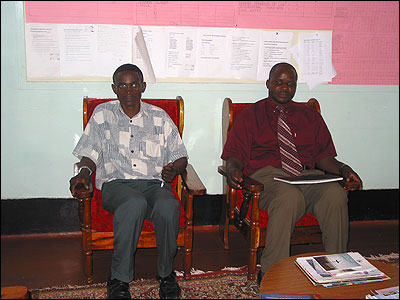
Elvis’s teacher and the attendance administrator
Next we were off to Jayhind, the local shop selling black plastic. The folks in Kantolomba had completed their survey of roofs needing plastic to get through the rainy season—753 (just shy of the total 800 homes) are deemed in need. We are buying the plastic in 100-meter rolls and are able to cover 16 roofs with each roll. We bought the first 6 rolls late last week, and the plan was to buy 25 more today. As the workers wheeled out the 25 rolls, I realized we over estimated how much could fit in the car. Everyone (all the men in the shop) assured me it would fit and would not be too much weight. They loaded it all in, I took one look at the sagging tires, and we promptly unloaded half the rolls. It is hard enough getting to Kantolomba on the mostly dirt, very uneven, sometimes-more-like-paths roads without having hundreds of extra pounds. The shop owners agreed to store the balance of our plastic overnight to wait for a second trip.
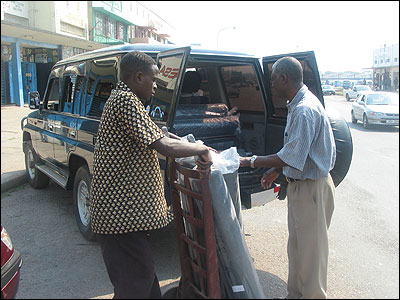
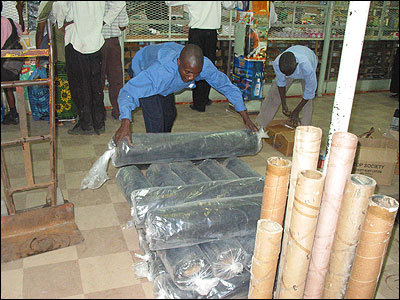
Not wanting the car to carry that weight for too long, we headed straight to Kantolomba.
e unloaded the plastic at Beauty’s house. Beauty is quickly becoming a saint in my view. She is someone who just seems to enjoy participating in life, without needing people to notice her efforts. (Remember, she is the one with 6 children, two grandchildren and her own seventh child on the way). It is she whom Theresa trusts to watch over things in the projects when Theresa cannot be there.
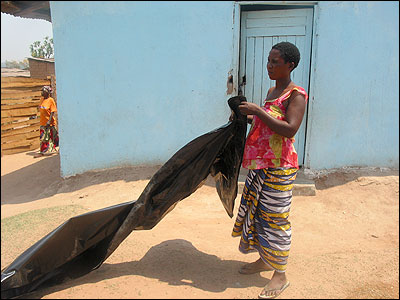
We then went to the school where the sewing teachers had brought the machines to show me how they look all set up in the classroom. To the folks using them, they are tools; to me, they look more like works of art. I successfully persuaded Theresa of the merits of the adult sewing students making the uniforms for the children. As soon as the students have a few more basic skills under their belts, they will begin the uniforms.
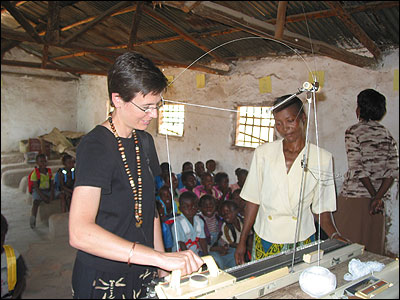
Jen gets to try out the knitting machine.
We were excited to see that both the garbage collection and black plastic projects were moving forward. Our new plan, hatched the day before, seemed to be working. Several women (under Beauty’s direction) had cut the first 31 pieces of black plastic. Everyone has decided that these first pieces should be given out tomorrow when the press may be here to document the government trash trucks coming.
One of the four garbage collection points is just across from the school, and we witnessed several dozen people ferrying buckets of trash on their heads to the site. 80% of the participants were children. It was a pleasure to see the trash coming off the roadside and into a central spot and knowing that it will be hauled off tomorrow. Running around to government offices and banks and internet cafes to do behind-the-scenes coordination is fun, but it is nothing compared to witnessing the actual fruition of a project. Tangible transformation is as good as it gets. But, there was more business to be done. So after thanking each of the participants, we continued on.
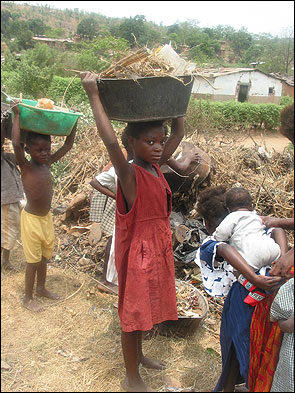 |
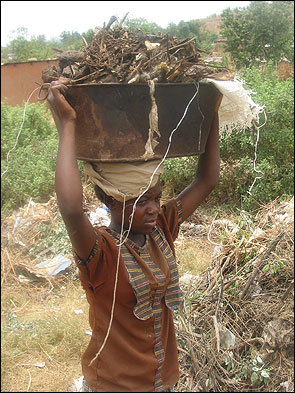 |
|
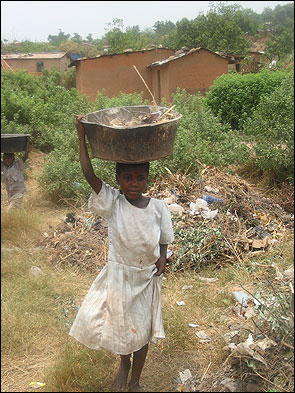 |
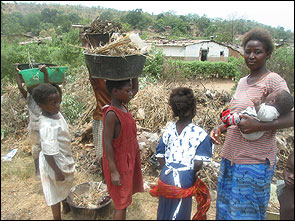 |
Thinking we would not be in Kantolomba until the afternoon, we had arranged to meet the RDC Chairman and owner of the property we were about to buy at 14 hours (2 PM) to sign a purchase agreement. It was now only 11:30 AM so we had to go to find him. Rumor had it that he was with the crew bulldozer leveling new ground for the quickly expanding graveyard that borders the whole southern edge of Kantolomba. As we drove through the graveyard roads, I was struck by the amazing beauty of the area. Suddenly there are no houses, no people, no trash, just bush. It is Africa in there, the Africa you think of from the movies, or National Geographic. And there, among that beauty is a nearly unbelievable reality. There are thousands of graves. They lie less than two feet apart. The simple, homemade markers read birthdates: 1979, 1970, 1968, 1967, 1977, 1972, 1965… There is a whole generation dying in southern Africa. It is so easy to forget that, even being here in Zambia. Day-to-day life goes on, people care for their children, do the business of making ends meet (or not), visit with friends, walk in the streets. Meanwhile, everywhere, young people are dying. Not a day goes by when you do not see trucks filled with well-dressed people riding in the bed, singing. They are mourners on the way to funerals—most of them for young people. Theresa and others tell me there are four or five burials daily at the Kantolomba graveyard everyday, one of several graveyards in Ndola, one of dozens of cities in Zambia, one of dozens of countries in southern Africa. The enormity of it is too much to “get.”
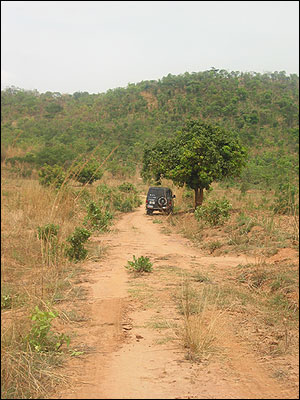
We found the Chairman in the far reaches of the graveyard, out past even the unmarked graves, where those whose relatives cannot afford the simple grave marker are buried. We turned our attention away from this morbid reality to conduct our business. The RDC Chairman is someone we have come to have a fondness for, even as we guess he might not be someone with whom we share much common ground. He has five wives—legal in Zambia. He is open about caring and trusting the first wife the most (Theresa finds it repugnant that he would openly express such a preference). The seven of us (Theresa, the RDC Chairman, the Coordinator, another RDC representative, the Chairman’s son and friend and me) stood out in the middle of the bush under the hot sun and signed papers to transfer this ½ acre of property in Kantolomba, Ndola, Zambia. It was an extraordinary ordinary moment.
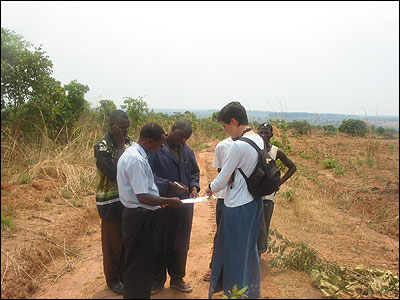
We stopped at the actual house to give the 6 million kwacha to the first wife. We made a verbal agreement that Living Compassion will take possession of the property on November 6 and will draw up written papers saying the same that we will all sign tomorrow. So, it is done. We officially own the property that will house the community center, including the medical clinic. There’s no stopping us now!
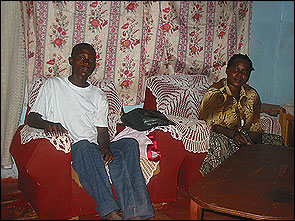
The RDC Chairman’s first wife and son.
We then proceeded to the Guest House where Theresa and I met about some details over a quick lunch. We were feeling very international as ¾ of the way through our meeting, Theresa received a call on her cell phone from Brother John in Rome and moments later my phone rang, Cheri calling from California.
After lunch we went to the bank where our piles of 100 kwacha notes were waiting for us. Paul wished us luck with our project the next day. Next we went to the driving school to pay for Theresa’s course. The woman behind the desk remembered us and was glad we had chosen to go with their school. We asked her if she knew how to drive, and she smiled broadly saying she is learning. We all agreed knowing how to drive changes everything. Not many Zambians have a driver’s license, and almost all of those who do are men. A Zambian woman getting a driver’s license is a big deal.

Realizing that we wanted to have a copy of the site plan to bring back to the U.S. with us, we went to Steve’s office to pick up a copy. He had also offered to make a copy of a map of Ndola for us—something we have been in search of for months. When we got there, it turned out their copy machines were down. So, together with Nobel and originals of the site plan and Ndola map, we headed back to the town center to get copies. One-stop shopping does not exist in Zambia, no big Staples where you can be guaranteed they will have what you need. Luckily, Nobel knows all the back alleys and little shops so after a few stops we got what we needed.
It was just past 5:00 PM, and we had made Theresa late for her computer lesson. We hurried over to the internet café where the team had a short lesson, while I did a bit of email.
Finally home to the Guest House for dinner and blogging.
